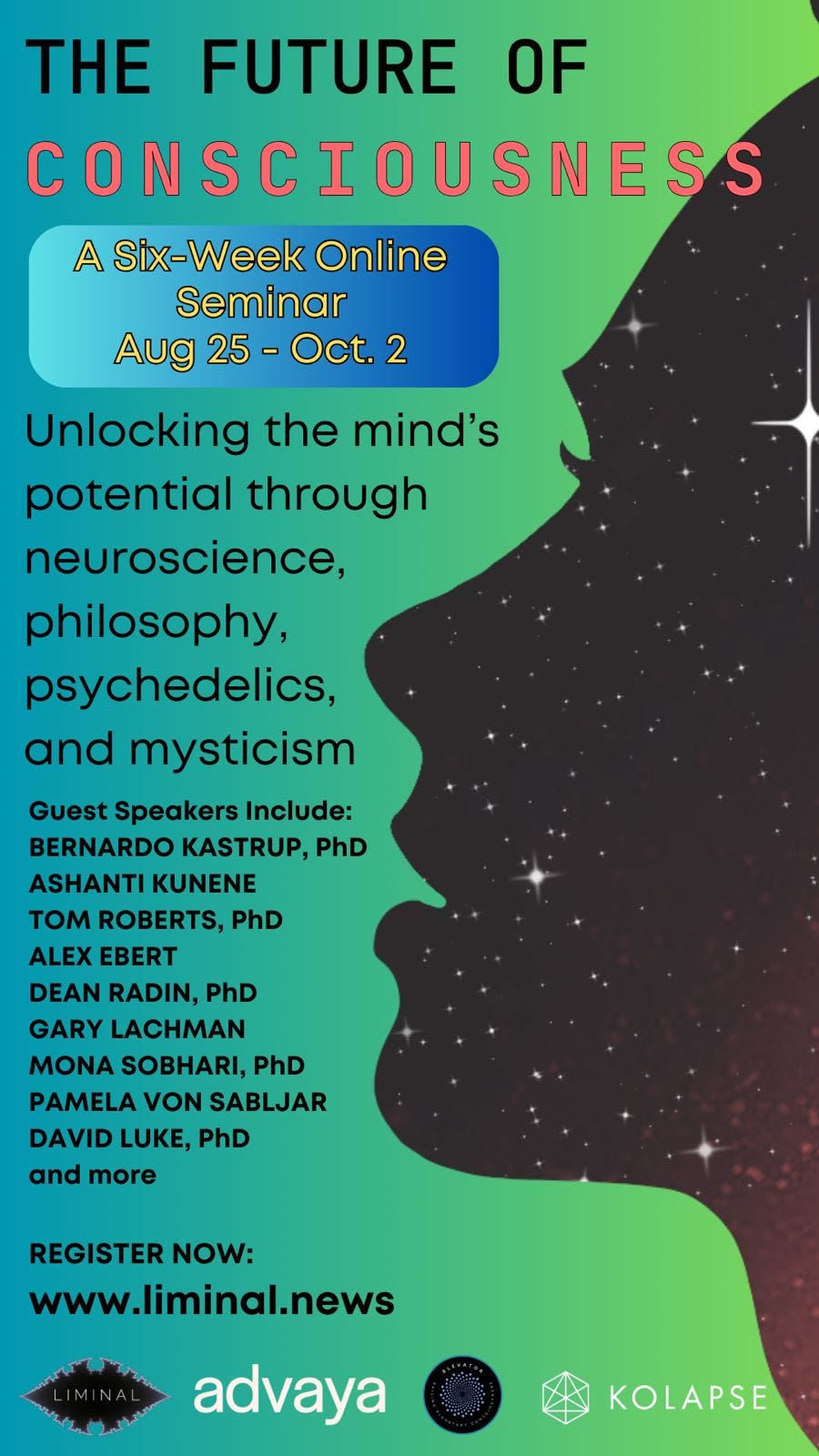Issue 22: Focus On Falling In (And Out Of) Love
Don’t fall in love; rise with it. —Amit Abraham
Apologies for the delay in producing this issue; we’re hard at work with the Future of Consciousness seminar, which is going very well, almost 200 signups now - we also thank advaya for their help - and it’s not too late to join us, see below.
We’ve done issues on sex and on tantra (which often has a sexual-sensual focus of course), but not on falling in love, that utterly joyous, terrifying, anxiety provoking, stimulating, insane, beautiful and above all alive experience. If you are in love, the one thing you can say for sure is that you know you are really living. You may wish you weren’t at times, but the overall feeling is like a life previously viewed through an old black and white television has suddenly become multi-color… and now you’re inside the movie.
Neuroscience has explanations (or at least correlations) for what happens when we fall in love. And if things don’t work out and you fall out of love then neuroscientists can tell you what’s going on there too, and hopefully in future will be able to help it to not hurt so damn much. Because it really does.
Our wish for you is that you fall in love, and continue to love and be loved, so may it be.
(btw this post, like most of ours, is too long for it all to be shown in an email, but if you click on the title it will open the whole thing in the Substack website)
Table of Contents
Links
Giulio Tononi's Integrated Information Theory of Consciousness
Sabine Hossenfelder on The Limitations of Large Language Models in Consciousness
Consciousness Pre-Dates Life | Stuart Hameroff
Is Consciousness a Quantum Phenomenon? Recent Findings Lend Some Support to Orch OR Theory
Alex Ebert on The Overton Window
1 in 4 Unresponsive People with Brain Injuries May Be Conscious
Psychedelics Expose A Mysterious Link Between Language & Consciousness
Focus On: Falling In (And Out Of) Love
This Is Your Brain on Love – The Marginalian
There's No Such Thing As Casual Sex
Helen Fisher: The Brain Systems Behind Sex, Romantic Love, and Feelings of Attachment
Using the Logic of Neuroscience to Heal from a Breakup - Big Think
The 5 Stages Of A Relationship Every Couple Goes Through
Which of These Four Attachment Styles Is Yours?
The Time I Went On A Lesbian Cruise And It Blew Up My Entire Life
Overcoming Heartbreak Through Neuroscience and Brain Training Techniques
Nuggets From The Archive
Kingdom: A Must-See Short Film
Exploring the Universe: Can Multiple Personality Disorder Explain Life?
How I Attained Persistent Self-Love, or, I Demand Deep Okayness For Everyone
Events
THE FUTURE OF CONSCIOUSNESS
Yes we had to put it in Events, didn’t we? It started on the 25th August, but you can still register of course, there are four more weeks to go, and you can watch the recordings of the sessions that have already taken place.
Here are a couple of clips from the course so far. Firstly Jeffrey Kripal:
And Neil Theise:
Course: Introduction to Tamera | Tamera Peace Research and Education Center
Introduction Week October in Tamera, Peace Research Center, Portugal, from October 4 - 10
We at The Elevator are very interested in what they are doing in Tamera. This ecovillage in Portugal is bravely creating a community which attempts to untangle the very painful area of love relationships between human beings. They may not be successful, but who knows, maybe they will. We think it’s worth checking out anyway.
Technological Metamodernism — Futurecraft
Sessions will take place 4pm–6pm UK time (BST/GMT)/5pm–7pm Europe time (CEST/CET) on four consecutive Tuesdays via Zoom, starting on Tuesday 17th September 2024.
What comes after Modernism? Post-Modernism, right? Well what comes after that? This is an introduction to Metamodernism, featuring Stephen Reid, Hanzi Freinacht (Emil Ejner Friis), Ellie Hain, Alexander Beiner, Michael Garfield & Rufus Pollock.
Psychedelics & Social Justice
Thu 10th Oct 2024, 7pm – 9pm BST (UTC +01:00). Online
This class from the UK Psychedelic Society seems overdue in redressing the balance back towards the social justice values that the psychedelic movement was originally associated with and away from the conspiratorial or narcissistic slush so often prevalent today, or a narrow focus on medicalized uses.
Links
Enhancing Meditation Retreats
Following on from the last issue on Consciousness Hacking, it just so happens that meditation teacher Shinzen Young and neuroscientist Jay Sanguinetti have recently launched a crowdfunding campaign to support the first ever transcranial focused ultrasound meditation retreat. Can’t think of a better cause to donate to!
Giulio Tononi - What's the Essence of Consciousness?
Giulio Tononi's Integrated Information Theory of Consciousness, which we have mentioned before in the newsletter, proposes that consciousness arises from maximally irreducible conceptual structures created by mechanisms in the physical world. These structures must have certain definite properties for consciousness to arise, as Tononi himself explains in this video.
How could we tell whether AI has become conscious?
Sabine Hossenfelder argues that large language models, such as those used in chatbots like ChatGPT, don’t possess the ability to self-monitor, and therefore are not conscious. While AI models can make predictions and learn from data, they lack the ability to self-correct and, crucially, to have a model of themselves and their environment. She also touches on the potential implications of machines becoming conscious, including the need for protection and the looming possibility/old chestnut of treating AI as slaves.
Consciousness pre-dates life | Stuart Hameroff
Neuroscientist Stuart Hameroff argues that consciousness may have existed before life emerged. He suggests that consciousness is a fundamental aspect of the universe, akin to space and time, which pre-date living organisms. This idea implies that consciousness is not solely a product of biological processes in the brain but rather a deeper, universal property that underlies all existence, potentially predating even the first living cells. There is more depth in this article if you are interested in Hameroff’s theory.
Is Consciousness a Quantum Phenomenon? Recent Findings Lend Some Support to Orch OR Theory
A neuroscientist's quest to understand consciousness has led him to a radical conclusion: that this fundamental aspect of human experience is not generated by the brain, but rather arises from a more universal and mysterious source. According to Jack Tuszynski, a professor at the University of Alberta, consciousness may be an emergent property of a complex system that operates independently of biology, much like the way that water flows through pipes or electricity flows through wires. This perspective challenges traditional views on the nature of mind and brain, and has significant implications for our understanding of human identity and existence.
The Integral Guide
This is a super-useful resource: the Obsidian notes of ‘Levi’ on everything he’s learned on his spiritual quest, all shared for free. Meditation, IFS, dealing with all kinds of challenges, even how to clean your kitchen.
The Overton Window | Alex Ebert in dialogue with Tim Adalin
Alex Ebert - always good value (and speaking soon in our Future of Consciousness course) - discusses the concept of the Overton window with Tim Adalin, highlighting its significance in shaping what is considered politically acceptable and feasible. The Overton window represents the range of opinions and policies that are currently deemed acceptable, and shifting it influences the scope of political discussions and implementations, as lawmakers adapt to reflect societal norms.
1 in 4 Unresponsive People with Brain Injuries May Be Conscious | Scientific American
Research suggests that up to a quarter of people who appear unresponsive after brain injuries may still be conscious, despite not showing any signs of awareness. This is known as "locked-in syndrome," where patients are aware and awake but unable to move or communicate due to severe physical impairment. Scientists estimate that between 10% to 25% of patients in vegetative states may actually possess consciousness, highlighting the need for more nuanced assessments and potentially leading to long-overdue new treatments and ways of caring for the unfortunate people trapped inside their own bodies.
Psychedelics Expose A Mysterious Link Between Language & Consciousness
Jenelle Rofe explores recent research which suggests that psychedelics affect language processing by suppressing the Default Mode Network in the brian (effectively the ego), leading to more disorganized, emotional, and bizarre speech patterns. These effects show the deep intertwining of language and consciousness, with language shaping our perception of reality and potentially being fundamental to human self-awareness. The difficulty in articulating psychedelic experiences (ineffability) further emphasizes this connection. Studies on LSD's impact on speech and the writings of people like Helen Keller underscore how language may be crucial to forming a narrative self. These findings could suggest potential therapeutic applications for language-related disorders.
Tweet by Vince Fakhoury Horn, from the Buddhist Geeks podcast, commenting on this video What Creates Consciousness?
“What creates consciousness?”
Do you notice the assumptions inherent in this question?
Here it is, in case you don’t: Consciousness must be a by-product of something else, rather than being an inherent characteristic of reality.
Well, how do we know that?
Fact is, we don’t, it’s a leap of faith. The faith is called Rational-Materialism.
The hard problem is only hard because of the way it’s framed.
Focus On: Falling In (and out of) Love
You will always fall in love, and it will always be like having your throat cut, just that fast. —Catherynne M. Valente
This Is Your Brain on Love – The Marginalian
Maria Popova explores the neural mechanisms behind romantic love, showing that it activates the brain's reward system, releasing dopamine and endorphins to create a feeling of euphoria. This "love high" involves changes in brain chemistry, including increased activity in areas associated with pleasure, motivation, and attachment, such as the nucleus accumbens and the ventral tegmental area. As love progresses from infatuation to attachment, different brain regions become involved, including those linked to emotional processing, memory, and social behavior, ultimately rewiring the brain to prioritize the loved one's needs and well-being. Which is nice.
There's No Such Thing As Casual Sex
Jamie Wheal pays tribute to the recently deceased researcher on human sexuality and relationships Dr. Helen Fisher. He is in agreement with her findings that ‘casual sex’ is a myth and doesn't actually exist. He claims that even in situations where individuals are engaging in brief, uncommitted sexual encounters, there's often an underlying emotional connection or expectation of intimacy. This emotional investment makes the experience anything but casual, as people bring their own desires, needs and emotions to the encounter. Wheal suggests that it’s probably the emotional aspect which is what truly defines a person's sex life, rather than the length or formality of a relationship. BTW Jamie is speaking at The Future of Consciousness soon.
How to date, mate, and find fulfillment | Helen Fisher & more
More Helen Fisher: the brain systems behind sex, romantic love, and feelings of attachment play a crucial role in maintaining long-term partnerships. Research highlights the importance of these systems, which are not simply phases but rather fundamental aspects of human relationships. Sustaining all three - sex drive, romantic love, and deep attachment - is vital for a happy partnership, with novelty in romantic relationships and physical touch and intimacy contributing to sustained feelings of intense love and connection.
Using the logic of neuroscience to heal from a breakup - Big Think
More from Big Think on this. A breakup can have a profound impact on our brain chemistry and behavior, to say the least: triggering a complex response that involves the release of various neurotransmitters. According to neuroscience research, breakups activate the same neural pathways as physical pain, releasing dopamine, endorphins, and other chemicals that can lead to feelings of sadness, anxiety, and longing. This "breakup neurochemistry" is thought to be an evolutionary adaptation that helped our ancestors to respond quickly and intensely to threats, including the loss of a romantic partner. As a result, breakups can have a lasting impact on our mood, motivation, and overall well-being, requiring time, support, and self-care to recover from.
The 5 Stages Of A Relationship Every Couple Goes Through
A romantic relationship progresses through distinct stages, each marked by a shift in emotional and psychological dynamics. The initial "honeymoon phase" is characterized by intense excitement and infatuation, driven by dopamine and oxytocin release. As the relationship deepens, couples enter the "intimacy stage," where trust and vulnerability are established. The next phase, "power struggle," brings conflicting needs and desires to the forefront, often accompanied by feelings of frustration and conflict. If both partners navigate these challenges successfully, they may reach a period of "stable connection," marked by mutual understanding, respect, and a sense of security. Ultimately, some relationships may culminate in a final stage of "growth or decay," where couples must confront their differences and make choices about the future of their partnership.
Which of These Four Attachment Styles Is Yours?
Research on attachment styles suggests that people tend to fall into one of four categories: secure, anxious-preoccupied, dismissive-avoidant, and fearful-avoidant. Each style is shaped by early relationships with caregivers, influencing how individuals see themselves and others in romantic partnerships. This article includes that thing we all love: a quiz - to determine which attachment style is yours. See also Val Smith’s post about attachment styles and why we often remain immature in our relationships.
The Time I Went On A Lesbian Cruise And It Blew Up My Entire Life
Shannon Keating explains how her experiments with non-monogamy led her to join a ‘lesbian cruise’ with over 2000 passengers and how she ended up having quite the adventure, falling in love with another passenger despite the explicit warnings of her partner against doing precisely that. It’s a very entertaining read.
Can We Choose to Fall Out of Love? | DESSA | TEDxWanChai
Dessa, a member of hip-hop collective Doomtree, shares her long journey of overcoming heartbreak through neuroscience and brain training techniques. Using neurofeedback to retrain her brain, she was able to overcome persistent clinging feelings for her ex by understanding how different regions of her brain responded to love.
Why Love Hurts: The Sociology of How Our Institutions Rather Than Our Personal Psychological Failings Shape the Romantic Agony of Modern Life – The Marginalian
We started with Maria Popova and we also close with her. Rather than imagine that love and relationships are a purely psychological or neurochemical matter, here she reminds us, in her review of Eva Illouz’s book ‘Why Love Hurts’, that sociology also plays a very important role in how we relate intimately to each other. Illouz argues in the book, and her subsequent work ‘The End of Love’, that the romantic ideals we created in the past have led to unrealistic expectations and, ultimately, disappointment. Traditional courtly love, which emphasized chivalry and sacrifice, has given way to a consumerist approach, where love is seen as a product to be acquired and discarded. This shift has led to a culture of disposability, where relationships are viewed as temporary and easily replaceable, and individuals are left feeling isolated and unfulfilled in their pursuit of romantic love.
“There is hardly any activity, any enterprise, which is started with such tremendous hopes and expectations, and yet, which fails so regularly, as love” - Erich Fromm
Nuggets From The Archive
KINGDOM - Animated Short Film
It’s hard to describe this short film, other than to say it’s incredibly resonant, archetypal (in the Jungian sense), and a must-see. It shows how we are chained, and suggests how we may break free.
Could Multiple Personality Disorder Explain Life, the Universe and Everything?
Bernardo Kastrup, Adam Crabtree, and Edward F. Kelly explain the theoretical framework which proposes that multiple personality disorder (otherwise known as Dissociative Identity Disorder) could be used to explain the fundamental nature of reality, including the existence of the universe. This idea suggests that consciousness is a fundamental aspect of the universe, much like space and time, and that ‘Mind At Large’ or universal consciousness can take on different "personalities" or forms, similar to those experienced by individuals with MPD.
How I Attained Persistent Self-Love, or, I Demand Deep Okayness For Everyone
Author Sasha Chapin shares a personal journey of cultivating self-love through mindfulness and acceptance. By focusing on his body's sensations and emotions, he learned to let go of negative self-talk and develop a sense of compassion for himself, ultimately achieving a state of persistent self-love that has improved his mental and emotional well-being.















Thank you for the link to my essay! As always, there’s a lot of great paths to walk in your findings, it makes for a fun exploration. Thorough, unique and great memes! May come back with more comments as I go, thanks for putting this together